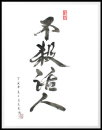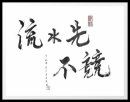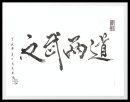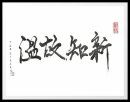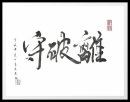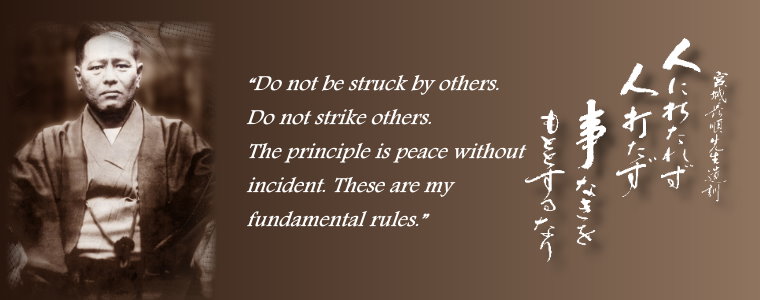
Martial Arts Philosophy
The following expressions of wisdom are intended to advise and motivate the martial arts practitioner. - page contents and Chinese Calligraphy Art used with permission of Chinese Calligraphy Artwork
Fusatsu Katsujin (Protect People Without Injury )
Fusatsu Katsujin (Protect People Without Injury): one must not embark on a course of action designed to cause injury.
Fudoshin (Steadfast)
Fudoshin (Steadfast): is a state of equanimity or imperturbability (literally and metaphorically "immovable heart" or "immovable mind") - a philosophical/mental dimension to a (commonly Japanese) martial art which contributes to the effectiveness of the advanced practitioner.
Do Mu Gen (There is no end to learning "the way")
Do Mu Gen (There is no end to learning "the way"): there is no end to learning. Even at advanced levels, there are still higher levels to reach. There is no point at which one's skill or understanding is complete. Learning "the way" is done day by day, minute by minute, second by second, now, to eternity. There is no faster way.
Ryu Sui Saki o Kiso Wasu (Flowing water does not compete)
Ryu Sui Saki o Kiso Wasu (Flowing water does not compete): The highest good is like water. Water gives life to the ten thousand things and does not strive.It flows in places men reject and so is like the Tao.
Bunburyodo (Pen and Sword in Accord)
Bunburyodo (Pen and Sword in Accord): true progress in the martial arts is only possible if we cultivate ourselves through the even balance of 'austere conditioning', 'philosophical assimilation' and 'literature' Martial arts or ways in its real sense was character building in embodiment of physical, mental and spiritual excellence.
Onkochishin (Study the old to understand the new)
Onkochishin (Study the old to understand the new): Examine things of the past, and obtain the new knowledge and the opinion from there.Taking a lesson from the past. Taking a lesson from the wisdom of the ancients. Follow the old ways.
Renma (Practice and polish)
Renma (Practice and polish): It takes 1,000 days to forge the spirit and 10,000 to polish it.
Shin-Gi-Tai (Mind/Work/Body)
Shin-Gi-Tai (Mind/Work/Body): the coming together of the mind, skill and body to produce a "complete person". These three human qualities are indicative of the essence of the heavens (represented by a person's mind), earth (an individual's skills) and man (by the body).
Shuuchuu (Concentration)
Shuuchuu (Concentration): the concentration of the entire body, unifying it into one focused point. If we can develop the ability to do this our technique greatly increases in power and effect. Shuuchuu is also a metaphor for life. We all know that success comes with full commitment to the task at hand.
Masakatsu agatsu (Victory Over Oneself)
Masakatsu agatsu (Victory Over Oneself): victory over oneself begins with a journey of recognizing one's own weaknesses, limitations and failings. The failure to confront one's own weaknesses is the principal barrier to finding one's true self, hence living a life in disharmony with our self and others.
Mushin (Clear mind)
Mushin (Clear mind): a state into which very highly trained martial artists are said to enter during combat. The term is shortened from mushin no shin (無心の心}, a zen expression meaning mind of no mind. That is, a mind not fixed or occupied by thought or emotion and thus open to everything.
Shu Ha Ri (Obey, digress, seperate)
Shu Ha Ri (Obey, digress, seperate):
Shu: Observe the old without straying. The student directly studies the teacher's way. Ha. Break strict observation and adapt different teachings. This is the stage of experimentation and research. Ri. Leave, advancing beyond both former stages.
Michi or "Do" (The Way)
Michi or "Do" (The Way): the rich and varied journey of life, encompassing all opposites, connecting all things. The Great Journey is full of blessings for the person who has the eyes to see.

